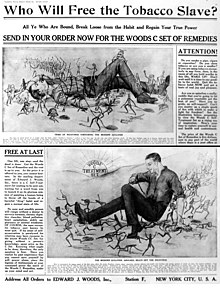
Back Substance dependence Amharic Drogadicción AN إدمان المخدرات Arabic ادمان المخدرات ARZ Narkomaniya Azerbaijani Наркаманія Byelorussian Нарказалежнасьць BE-X-OLD Наркомания Bulgarian মাদকাসক্তি Bengali/Bangla Drogoaddicció Catalan
| Drug addiction | |
|---|---|
| Classification and external resources | |
| ICD-10 | F10..2-F19..2 |
| ICD-9 | 303-304 |
| MeSH | D019966 |


Drug addiction, also called substance dependence or dependence syndrome, is a condition where a person feels a strong need to take a drug. Addiction also involves other behaviours. These include finding it difficult to control the need to use the drug and feeling the use of the drug to be more important than more normal things such as family or work.[1] When the person does not use the drug for an amount of time, they may suffer from withdrawal.[2]
When a person is addicted, they are usually addicted to a class (a specific kind) of drug. For example: Heroin is a drug that is in the Opiate class. Which means that a person addicted to Heroin may also be seen to have an addiction to other opiates such as Morphine.[3]
A person who may easily become addicted to drugs is said to have an addictive personality. The Diagnostic and Statistical Manual of Mental Disorders defines drug addiction as a mental disorder. Drug addiction is often linked with other mental disorders.
- ↑ International Classification of Diseases (ICD-10) [Code F10.2]
- ↑ National Institutes of Health website: "Drug dependence means that a person needs a drug to function normally. Abruptly stopping the drug leads to withdrawal symptoms. Drug addiction is the compulsive use of a substance, despite its negative or dangerous effects." Drug Dependence
- ↑ Mosaic, Emma Young- (24 January 2017). "Iceland knows how to stop teen substance abuse - but the rest of the world isn't listening". triple j.